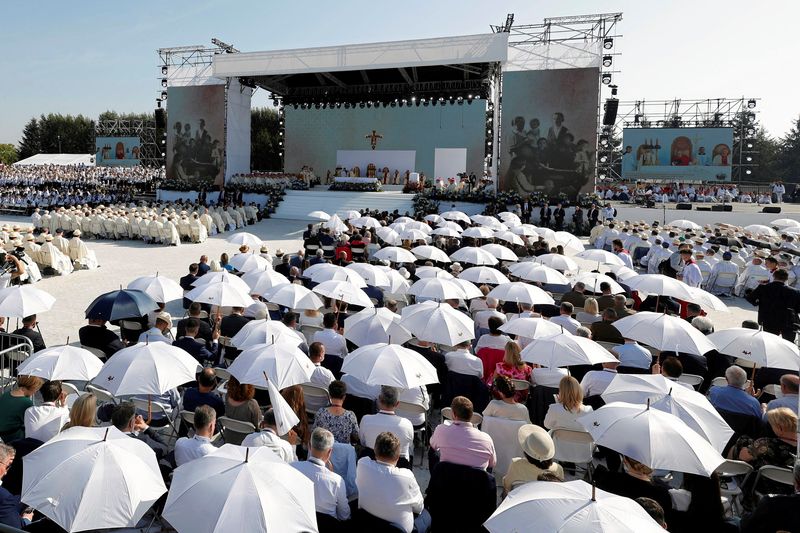
© Reuters. People attend the beatification ceremony of the Ulma family, who were murdered by German Nazis for sheltering Jews in Markowa, Poland September 10, 2023. Patryk Ogorzalek/Agencja Wyborcza.pl via REUTERS
2/5
WARSAW (Reuters) – The Catholic Church beatified on Sunday a Polish family of nine, including a new-born baby, who died at the hands of Nazi Germans during World War Two for sheltering a Jewish family from the Holocaust.
The beatification service for Jozef and Wiktoria Ulma and their seven children was held in the southeastern Polish town of Markowa where they died in March 1944 at the hands of German military police.
Cardinal Marcello Semeraro read a letter from Pope Francis during a mass attended by Poland’s president and prime minister, among others.
“We authorise that from now on the venerable Servants of God, Jozef and Wiktoria Ulma, spouses and their seven children… (who) fearlessly sacrificed their lives for the sake of love for their brothers and welcomed into their home those who suffered persecution, be given the title of blessed,” the Pope wrote.
After the announcement of the beatification, a painting of the family was unveiled and a reliquary containing their remains was brought to the centre of the stage.
Beatification is the last step before sainthood in the Roman Catholic Church. Vatican media have noted that it is the first time that an entire family has been honoured together in this manner.
Speaking at the Vatican, Pope Francis described the Polish family as a “ray of light” in the darkness of World War Two and said they should serve as a model for others to follow.
He initiated a round of applause for them from pilgrims gathered in St Peter’s Square to hear his Angelus message.
HOLOCAUST
Some three million Jews who lived in pre-war Poland were murdered during the Nazi German Holocaust, accounting for about half of all Jews killed during World War Two.
Jews from across the continent were sent to be killed at death camps built and operated by Germans in occupied Poland – home to Europe’s biggest Jewish community at the time – including Auschwitz, Treblinka, Belzec and Sobibor.
The Ulma family has been at the heart of the nationalist Law and Justice (PiS) government’s efforts to highlight the courage of those thousands of Poles who had sought to help Jews escape the Holocaust.
The policy has driven condemnation from Jewish organisations and some historians for minimising the role of those who collaborated with the Germans. PiS says commemorating those dishonours the country.
In the region of Markowa, some historians have said witness testimonies show some local residents looted Jewish houses, denounced Jews to Germans, or even killed them themselves.
“How we discuss the history of this region is a wasted opportunity. If we showed what some Poles did then, we would be showing the heroism of the Ulmas to its full extent,” said Dariusz Libionka, a historian with the Polish Academy of Sciences.
Poland’s Institute for National Remembrance (IPN) has said that research by Libionka and fellow historian Jan Grabowski contains factual errors and denies that a museum in Markowa has omitted or concealed information about Polish involvement in the deaths of Jews.
Thousands of Poles risked their lives to protect Jewish neighbours during the war. But research published since the fall of communism in 1989 showed that thousands also killed Jews, or denounced those who hid them to the Nazi occupiers, challenging the national narrative that Poland was solely a victim.
“We have an obligation to remember the righteous and have them as role models of who we want to be. And have to remember the collaborators because they are also role models of who we don’t want to be,” said Michael Schudrich, the chief rabbi of Poland.








